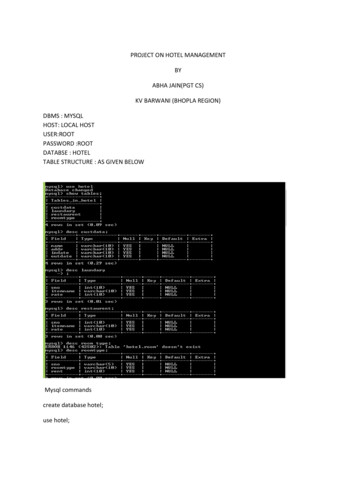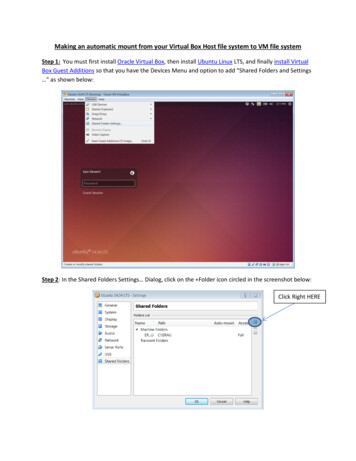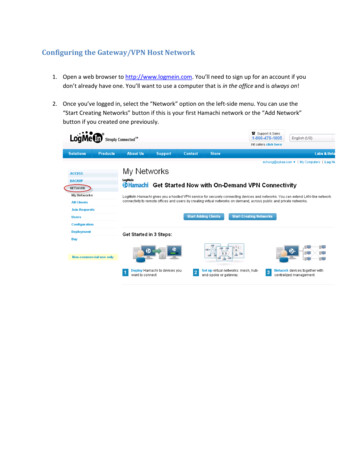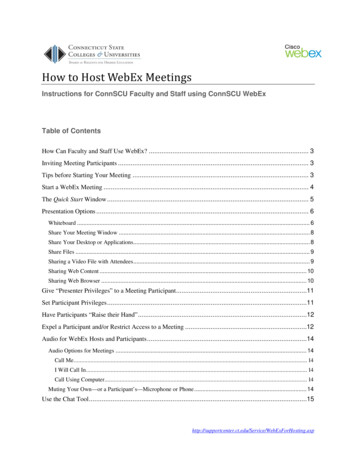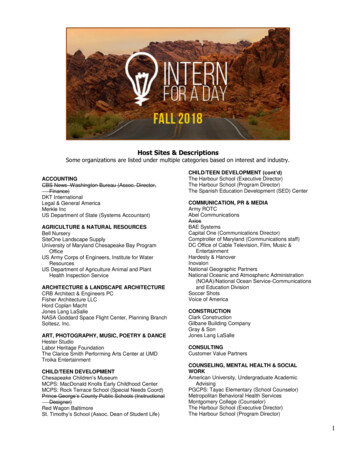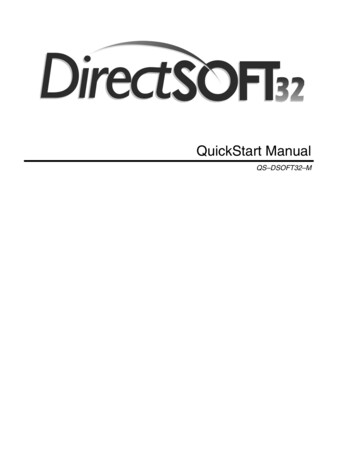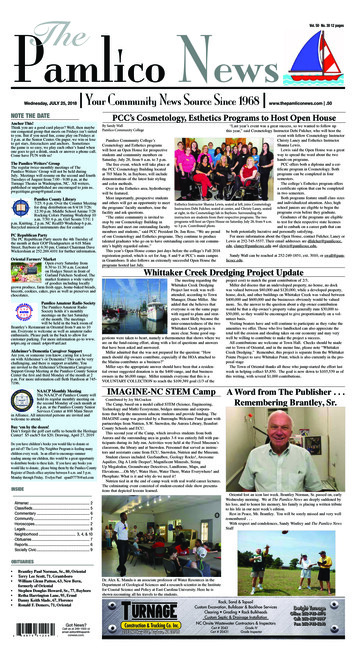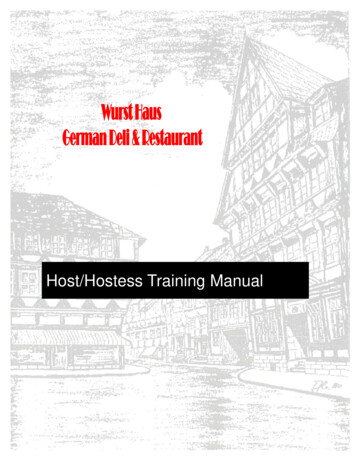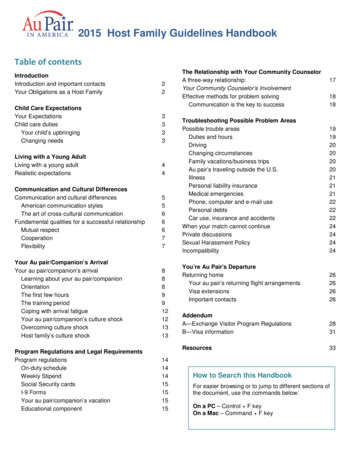
Transcription
2015 Host Family Guidelines HandbookTable of contentsIntroductionIntroduction and important contactsYour Obligations as a Host Family22Child Care ExpectationsYour ExpectationsChild care dutiesYour child’s upbringingChanging needs3333Living with a Young AdultLiving with a young adultRealistic expectations44Communication and Cultural DifferencesCommunication and cultural differencesAmerican communication stylesThe art of cross-cultural communicationFundamental qualities for a successful relationshipMutual respectCooperationFlexibility5566677Your Au pair/Companion’s ArrivalYour au pair/companion’s arrivalLearning about your au pair/companionOrientationThe first few hoursThe training periodCoping with arrival fatigueYour au pair/companion’s culture shockOvercoming culture shockHost family’s culture shock8889912121313Program Regulations and Legal RequirementsProgram regulationsOn-duty scheduleWeekly StipendSocial Security cardsI-9 FormsYour au pair/companion’s vacationEducational component14141415151515The Relationship with Your Community CounselorA three-way relationship:Your Community Counselor’s InvolvementEffective methods for problem solvingCommunication is the key to success1818Troubleshooting Possible Problem AreasPossible trouble areasDuties and hoursDrivingChanging circumstancesFamily vacations/business tripsAu pair’s traveling outside the U.S.IllnessPersonal liability insuranceMedical emergenciesPhone, computer and e-mail usePersonal debtsCar use, insurance and accidentsWhen your match cannot continuePrivate discussionsSexual Harassment 424You’re Au Pair's DepartureReturning homeYour au pair’s returning flight arrangementsVisa extensionsImportant contacts26262626AddendumA—Exchange Visitor Program RegulationsB—Visa information2831Resources3317How to Search this HandbookFor easier browsing or to jump to different sections ofthe document, use the commands below:On a PC – Control F keyOn a Mac – Command F key
Introduction Never leave the au pair in sole charge of a childovernightIntroduction and Important Contacts Never leave an au pair in sole charge of an infantunder 3 months of age Provide automobile insurance coverage as requiredif the au pair is to be driving Pay the au pair the current stipend rate for 51weeks (52 weeks for Year2 au pairs) Provide the opportunity for the au pair to attendmonthly cluster meetings Maintain monthly contact with the communitycounselor Facilitate the opportunity for your au pair to registerand take the required educational classes Treat the au pair like a member of your family Participate in an annual host family day eventfacilitated by the community counselor Sign an agreement with the au pair upon her arrivalthat outlines days and hours of child care to beprovidedThis handbook will help you prepare for the arrival ofyour au pair/companion, the training and support you willneed to give your au pair and serve as a resourcethroughout the year long exchange.Your family and your au pair/companion have become apart of a cluster or group of others within yourcommunity who are enrolled with one of our programs.The cluster acts as a support system.Your Community Counselor is our program’s fieldrepresentative and is there to provide information andguidance to all members of the cluster. Your CommunityCounselor interviewed you and through orientation willhelp prepare you for the arrival of your aupair/companion.Your Community Counselor will work with you tocoordinate travel arrangements for your aupair/companion to get to your home. He/she will maintainregular contact, help organize social activities for the aupairs and companions in the cluster, assist your aupair/companion with the educational component of theprogram and act as facilitator if conflicts arise betweenyou and your au pair/companion.Note: For purposes of clarity, we will use the pronoun“him” to describe your child, and the pronoun “her” todescribe your au pair or companion.The term au pair refers to participants on our au pair orExtraordinaire program. Companions are participants onour EduCare program.Your Obligations as a Host FamilyAs a host family with Au Pair in America you haveagreed to comply with the following program rules andregulations. Throughout this document we will explaineach of these in detail and offer guidance that we hopewill help get you off to the best possible start with yournew au pair/companion. You have agreed to do thefollowing: limit child care responsibilities to 45 hours a week ifparticipating in the au pair/Extraordinaire program or30 hours per week for the Educare program Scheduled working hours will not exceed 10 hoursper day or extend more than five and a half daysper week The au pair must have one full weekend off eachmonth At least one parent will be home during the first 3days after the au pair has arrived in your home2 AU PAIR IN AMERICA
Child Care ExpectationsYour Child’s UpbringingThere are two specific areas of responsibilities your careprovider will have—child care duties and the upbringingof your child.Your care provider will also play an important part inyour child’s upbringing. It’s important that she follow yourphilosophy on child rearing, your rules about mannersand your methods for disciplining. You will have to thinkcarefully about your ideas on these subjects so that youwill be able to clearly explain them. How do thesephilosophies translate into action? Special noteregarding disciplining actions: As you explain yourapproach to child discipline please keep in mind that aupairs are instructed during their orientation program thathitting or smacking a child is unacceptable.Child Care DutiesChanging NeedsThe child care duties you assign might include,depending on the child’s age, feeding, bathing anddressing your child, planning your child’s daily activitiesand playing with your child, supervising and babysittingand transporting your child to school, the local pool orpark. You will have to think about what kinds of activitiesyou would like your child to do when you are away andconvey that to your au pair/companion.Your child care needs may change over the course ofthe year. Is another child on the way? Will you be goingon vacation? Will your child be in school for part or all ofthe day? What activities will your child be involved induring the summer and how will your aupair/companion’s involvement differ during the schoolyear? When will your au pair/companion be takingclasses and what transportation arrangements will yoube making? Flexibility will be important as you planschedules over the course of the year.Your ExpectationsThe first crucial step to a successful and mutuallysatisfying year with your au pair/companion is for you,the host parent, to determine what you expect from yourau pair/companion.Child care will be your au pair/companion’s primaryresponsibility. Additionally she will be able to help youwith chores that relate to your children. The extent towhich she can help you with child-related chores willdepend on how active your child is and how much of herattention he requires. If she spends most of her dayplaying with your child and making sure he is happy andsafe, she may not have much time to devote to chores.She may not have as much practice as you havewatching your child and getting child-related choresdone at the same time, and she may be worried yourchild will get into trouble while she is folding his laundry!Your child’s safety and happiness will always comebefore a neat house. Your au pair/companion can helpyou by tidying the kitchen after she feeds the children,making the children’s beds, doing the children’s laundryand tidying up after the children.Housework or chores such as vacuuming, mopping,dusting, pet care and total responsibility for cleaningyour house is not part of your au pair/companion’sresponsibilities.Refer to Program regulations for specifics on appropriateresponsibilities for your au pair/companion.The child care questionnaireYour au pair/companion will receive a questionnaire atOrientation and will be encouraged to complete it withyou. The questions are intended to serve as discussionpoints to help facilitate your training during the first fewdays after her arrival. Consider how you will respond byreviewing a copy of the questionnaire included in thispacket.AU PAIR IN AMERICA 3
Living with a Young AdultLiving with a young adultIt’s important to remember that your au pair/companionis an adult, but she is a young adult. Her behavior will beappropriate for her age group. When she first arriveseverything about your home and community, even yourlanguage and the manner in which you do things will beunfamiliar and strange to her. She will require guidance,support and friendship.Realistic expectationsThe most important thing to remember is not to expectany more from your au pair/companion than you wouldof yourself. Ann Muscare and Wendy Wardell Morronedescribe parents’ expectations in their book entitled,Child Care That Works—How Families Can Share TheirLives with Child Care and Thrive:“It may comfort you to know that most parents havetrouble striking the right tone. In general, parents begin byexpecting caregivers to be more consistent than humanlypossible. You want a caregiver who will never screamabout spilled food or cry after a day with a whiny child orcommit any of the other parenting sins that you have beenknown to commit yourself upon occasion. On the otherhand, you may want a care giver to do all the good thingsthat you do—make a fuss about a pretty dress, hug andkiss lavishly, ooh and aah when spoon succeeds in findingmouth If you have a single care giver, she’ll be tired by1evening, just as you would be.”Another important thing to remember is that, eventhough your au pair/companion will be living with you,she will not be available every minute. Don’t throw awayyour list of babysitters! You may still need to call onthem.It is important that you let your au pair/companion knowwhen she will be “on-duty” and when she will have timeto herself. Just as you need a break, so too will your aupair/companion. These breaks will be important from thevery start when her struggle with a new culture and anew language will be tiring her out just as much astaking care of your child!Establish an ”on-duty” schedule for your aupair/companion that considers her ability to effectivelycare for your children and keep them safe and happy.Her ”on-duty” schedule must not exceed 10 hours perday, 45 hours per week for standard and Extraordinaireparticipants; 10 hours per day, 30 hours per week forEduCare participants.Sharing your living spaceYour au pair/companion will be living in your home andsharing living space with you. Consider what areas ofthe home she may have full access to and areas thatshe may not. Tell your au pair/companion if there are4 AU PAIR IN AMERICAroom(s) you consider your private space and in turnrespect the privacy that your au pair/companion wouldexpect in her room.Physical contact between the host family and aupair/companion is strongly discouraged; while a brief hugand handshake may not be inappropriate depending onthe circumstances; such conduct may make your aupair/companion uncomfortable and should be avoidedfor that reason. The host father in particular should avoidany physical contact with the au pair and mustscrupulously adhere to the Sexual Harassment policy setforth in this document.
Communication and CulturalDifferencesCommunication and cultural differencesThe basis for developing a trusting relationship iscommunication. You may think, “It cannot be that difficultto explain how to take care of my child.” In part, you areright. We communicate with each other every day. Wetell each other what we think, how we feel, what to do,and in general, we are usually successful in getting thepoint across.People from other parts of the world may not have thesame basic assumptions about the world that we, asAmericans, share. Once this common ground is takenaway, communication becomes much more of achallenge. Words cannot simply be translated from onelanguage to another without some of the meaning beinglost because of cultural differences:“If we view languages only as communication tools, sets ofwords that can be exchanged for other sets and yield thesame meaning, we court the role of ‘fluent fools’ as wetranslate words without their original cultural context.Language serves as a tool for communication, but inaddition it is a system of representation for perception andthinking.”Most of us are familiar with obvious cultural differences.Americans do not take their shoes off when they enter aroom, but the Japanese do. Americans greet each otherwith a handshake, but the French kiss each other on thecheek. Most cultural patterns are so deeply ingrained inus that we never consider that there may be alternatives3to the way we “naturally” act, feel and think.American communication stylesThe first step to being able to communicate withsomeone from another country is to recognize how ourways of communicating as Americans are unique. Youmay not think that the way we speak with each other isstrange, but many of the au pairs/companions do! Thinkabout these comments from an au pair from theNetherlands.“Tell more about American habits: cooking, washing. And!!The way they speak with each other—even strangers. Ineeded one and a half weeks to know how to speak withpeople. Even to strangers, people here tell their deepestsecrets! Also the way they meet each other I have neverseen before.”She has intuitively hit on many of the things thatAmericans do that are not part of some other cultures.Informal & intimateInitially, your au pair/companion may be surprised athow casually you speak to people, no matter what yoursocial relationship. Americans are brought up to believethat all people are equal, so we tend to ignore socialdifferences when we speak. We encourage others to callus by our first names from the moment we meet them.(What will your au pair/companion call you?) Even moresurprising is our tendency to talk about personalexperiences and feelings with people whom we have justmet.DirectAmericans tend to be more direct than people from othercountries. Think about when you call someone for aspecific purpose. You quickly say hello and then get rightto the point. Many au pairs find these traitsdisconcerting. First, most foreign languages are moreformal than English. For example, most languages usetwo forms of the pronoun “you”—one to be used whentalking to family and friends and the other to be usedwhen talking to someone who is older or who has ahigher social position. Europeans and others rely on thesmall talk that precedes the main point of a conversationto determine their relationship to the person with whomthey are speaking. When this small talk is shortened to afew sentences and a “you” for your friend suddenlysounds no different than a “you” for your boss, your aupair/companion may become very confused about whereshe fits in and how she should act. Secondly, theAmerican habit of getting right to the point may also leadyour au pair/companion to mistakenly believe that youare being abrupt or harsh. Try to keep this in mind whenspeaking with your au pair/companion and bring thishabit to her attention.JudgmentalMany au pairs/companions mistakenly believe that theirhost families are being overly critical of them. Often, thissurprises the host parents. They cannot imagine whatthey said that led to this belief. Americans do not realizethat our language, by nature, calls for judgment. Mostother languages do not. For example, Americans wouldask, “How good is the food here?” The same question inmany other languages would translate to “How is thefood here?” An international visitor does not need tomake any judgment about the food. Their question iscompletely objective. Americans, on the other hand,must make some kind of assumption about the quality ofthe food to ask the question.Our language not only predisposes us to evaluatethings, it predisposes us to evaluate things negatively.Americans tend to focus on what should not be done,rather than on what should be done. This habit stemsfrom our belief that creativity is good, and conformity isbad. We are encouraged to decide for ourselves how wewill act and what we will do. The creative process ofmaking a decision is almost as valuable as the decisionitself. Your au pair/companion may feel that you arecriticizing everything that she does simply becauseyou’re concentrating on what she shouldn’t do instead ofAU PAIR IN AMERICA 5
suggesting what she should! Be as positive as you canwith your au pair/companion.international visitors use the same inflection when theyspeak in English as they do when they speak in theirown language.Questions and answersAmericans believe that the responsibility ofcommunicating rests equally on the speaker and thelistener. If we do not understand something that is said,we ask a question. If we disagree, we will share ourpoint of view. This back and forth banter is typical ofAmerican conversation. Consequently, you may assumethat your au pair/companion has understood all that youhave said because she has not asked you anyquestions. However, in some countries where sociallines are more clearly defined, the act of posing aquestion is interpreted as a challenge to authority and isconsidered rude. A good example of this trait is the wayclasses are conducted in foreign universities. Studentslisten to the professor, but never speak. Encourage yourau pair/companion to ask questions. She will feel morecomfortable if she knows that you will not think that sheis being rude if she does.Non-verbal cuesBody language also plays an important role in crosscultural communication. We pay a significant amount ofattention to the way people act when they talk. Our toneof voice, gestures, facial expressions, the distance westand from one another and the way we touch eachother carry even more meaning than what we actuallysay. Think about how you encourage certain types ofbody language from your children. How often have youencouraged your child to look at you when he isspeaking? Have you ever told your child that you do notlike his tone of voice? Remember that, just as our stylesof speaking are different from others around the globe,so too are the non-verbal clues that we use.So far we have focused on how your au pair/companionmay interpret (or misinterpret!) what you say and howyou act. Don’t forget that you may be tempted to do thesame thing. You may think that your au pair/companionmeant something that she never intended, simplybecause you translated her words or actions using yourAmerican point of view!One of the biggest reasons that we, as Americans, arelikely to misinterpret international visitors is because werely so much on the inflection in our voices to determinethe nature of a conversation. For example, when you asksomeone how she is, and she replies “wonderful” with arise in her voice, you are likely to think that she reallydoes feel fine. On the other hand, if she says “wonderful”with no change in her voice, you will probably believethat she does not feel well or that she is being sarcastic.This fact is important to recognize because people whoare not Native American English speakers often do notchange the inflection in their voices in the same way thatwe do. (Notice that we have made a distinction betweenAmerican English and British English!) Typically,6 AU PAIR IN AMERICAThe art of cross-cultural communicationWhen your au pair/companion says or does somethingthat is confusing to you, try to understand theassumptions that she made that led to her behavior andhow those assumptions differ from your own. First, youshould try to isolate the action or the words thatconfused you without making any judgments. What wasactually said or done? Then explain to your aupair/companion how the event or words translate intoAmerican culture. How did you
2 AU PAIR IN AMERICA Introduction Introduction and Important Contacts This handbook will help you prepare for the arrival of your au pair/companion, the training and support you will need to give your au pair and serve as a reso


